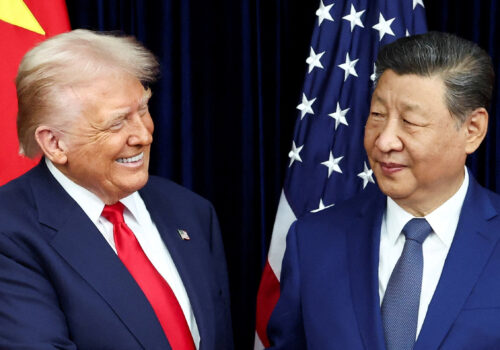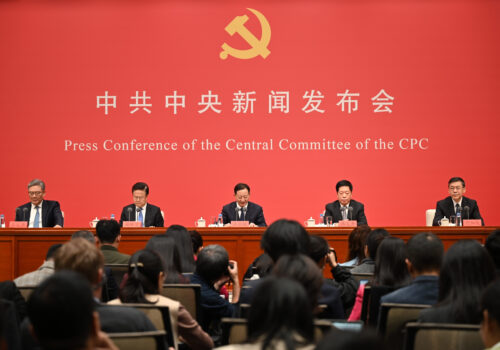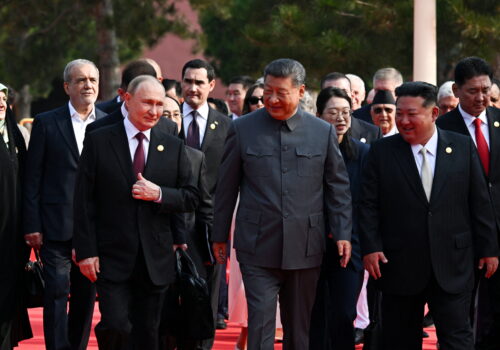Trump and Xi brokered a truce in the trade war. Will it hold?
GET UP TO SPEED
Is it a breakthrough, or just a break? US President Donald Trump said that he and Chinese President Xi Jinping reached agreement on “almost everything” in their meeting in Busan, South Korea, on Thursday. This included a one-year tariff truce, a reduction in overall US tariffs on Chinese goods, and a temporary pause on some new Chinese restrictions on rare-earth exports. “Almost everything,” however, did not include the fate of the social media app TikTok or larger questions around China’s market-distorting economic policies. Will the summit build momentum for a further reduction in US-China tensions? And how does Beijing view the meeting’s outcomes? Our experts break through the noise below.
- Josh Lipsky (@joshualipsky): Chair of international economics and senior director of the GeoEconomics Center, and former International Monetary Fund advisor
- Reed Blakemore (@reed_blakemore): Director of research and programs at the Global Energy Center
- Melanie Hart: Senior director of the Global China Hub and former senior advisor for China in the State Department’s Office of the Undersecretary for Economic Growth, Energy, and the Environment
- Markus Garlauskas (@Mister_G_2): Director of the Indo-Pacific Security Initiative at the Scowcroft Center for Strategy and Security and former National Intelligence Council official
What they agreed to
- The summit, Josh tells us, “delivered real results.” Beijing succeeded in getting tariff rates reduced to similar levels as its Asian neighbors, which he says is a “a welcome victory” for China’s struggling economy. Meanwhile, China agreed to resume importing US soybeans, which Josh says “will alleviate some of the pressure the administration had been feeling from farmers.”
- Trump, Reed says, “secured an important pause in China’s exploitation of its leverage in rare earth element supply chains,” adding that Beijing’s agreement to roll back export controls for a year “provides some urgently needed relief” to the United States.
- The meeting offered “no surprises,” Melanie points out, with expected outcomes such as China putting forward initiatives to crack down on fentanyl precursors that “it offered earlier this year” and the United States “ratcheting down tariffs accordingly.”
Sign up to receive rapid insight in your inbox from Atlantic Council experts on global events as they unfold.
Remaining concerns
- The deal should be treated as “a moment of relief, but not a solution,” Reed tells us. This is because China was able to use export restrictions as a “valuable lever in trade negotiations” and can be expected to use this same tactic again.
- Even with the one-year truce in place, “the scale of supply chain influence China displayed,” restricting not just raw materials but also manufactured components, says Reed, “will likely remain a source of uncertainty for the private sector.”
- Even the “wins” from the summit “just get us back to where we were before the US-China trade wars of the spring,” says Josh, who notes that “China still faces higher tariffs than it did when Trump came into office,” and many of the thorniest issues in the bilateral relationship were left undiscussed.
- This includes the issue of Taiwan, which according to Trump, Xi did not bring up at all during the meeting. While there may now be a truce of sorts on trade, Markus says, “there is no ‘truce’ in the ongoing struggle for the future of Taiwan.”
- “The Chinese Communist Party’s intimidation campaign to subjugate” Taiwan will continue, Markus tells us in between meetings in Taipei. However, despite concerns that the United States would go wobbly, “it also seems that Washington’s support for maintaining the status quo of Taiwan’s self-rule will do so as well.”
What’s next?
- “China and the rest of the world will be watching” next week’s Supreme Court hearing on the challenges to Trump’s tariff authority, says Josh. But whatever the court decides, he adds, “Trump won’t fully relinquish what he sees as the best tool in his economic arsenal—and that means a trade truce is likely the best either side can hope for in the near future.”
- Reed expects the Trump administration to “continue to aggressively pursue supply chain partnerships” such as the ones brokered with Australia and Japan, and that there will be renewed interest among the Group of Seven (G7) to better coordinate supply chain security during meetings this week. If Washington fails to do this, Reed warns, “negotiating with Beijing to secure these brief moments of supply chain relief will become the norm.”
- One “major win” for Beijing coming out of the meeting, says Melanie, lies in next year’s scheduled US-China talks. “China’s biggest concern with Trump is his unpredictability, and Beijing is using an extraordinary lineup of pre-scheduled 2026 meetings to box him in,” she writes. “Trump’s planned visit to Beijing in April,” says Melanie, “gives China the opportunity to script the next interaction and to press for a new wave of US concessions over the coming months.”
- While Chinese leaders “know exactly what they want ahead of these 2026 summits” with the United States, says Melanie, “there is still no indication that the US side has the same strategic clarity. The White House will need to prioritize developing it—fast.”
Further reading
Thu, Oct 30, 2025
Experts react: What does the Trump-Xi meeting mean for trade, technology, security, and beyond?
New Atlanticist By
The US and Chinese presidents met on Thursday to discuss issues ranging from tariffs to TikTok. Atlantic Council experts break down what came out of the tête-à-tête.
Fri, Oct 24, 2025
The winners and losers from China’s next five-year plan
New Atlanticist By Jeremy Mark
In Beijing, the Chinese Communist Party’s Central Committee met this week to move forward the country’s fifteenth five-year plan.
Mon, Oct 27, 2025
Trump’s place in history depends on his approach to the CRINK
Inflection Points By Frederick Kempe
After a string of foreign policy wins, Trump's more significant challenge lies ahead: countering the bloc of China, Russia, Iran, and North Korea.
Image: US President Donald Trump shakes hands with Chinese President Xi Jinping as they hold a bilateral meeting at Gimhae International Airport, on the sidelines of the Asia-Pacific Economic Cooperation (APEC) summit, in Busan, South Korea, October 30, 2025. REUTERS/Evelyn Hockstein


